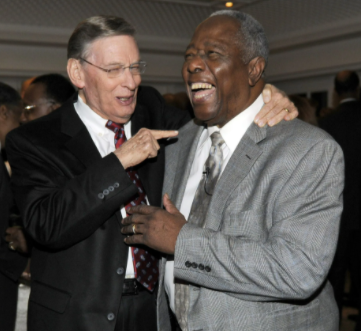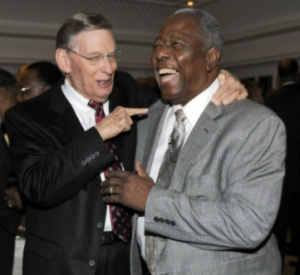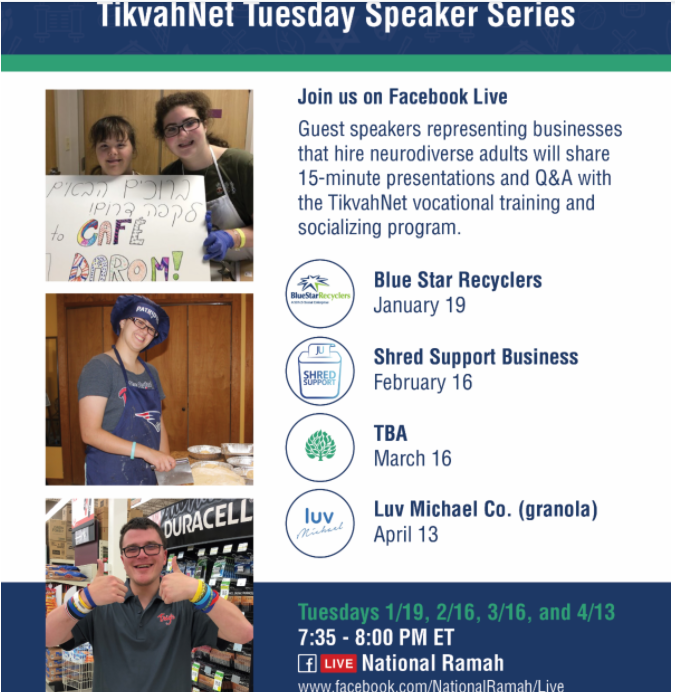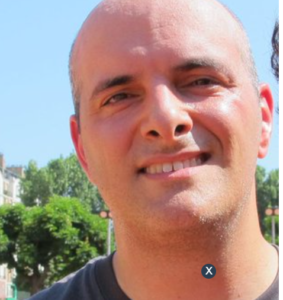In the summer of 1973, when I was a boy, we towed our 32-foot travel traveler to Stone Mountain, Georgia for a family vacation. As part of the trip, we would take a detour to Atlanta to see Hank Aaron play. We had the chance to see Hammerin’ Hank hit his 700th home run. The radio was going crazy letting it be known that the person who caught the home run ball and returned it would receive 700 silver dollars! I don’t believe we sat in the bleachers, but I do remember being excited to see my first game in a ballpark other than Baltimore’s Memorial Stadium. It was my first national game and it was against the New York Mets. It was awesome, except that the Braves chose to rest Hank Aaron that night. He would hit his 700th homer a day or two later, on July 21, 1973, against the Phillies’ Ken Brett, becoming just the second baseball player to ever hit 700 home runs in a career.
I was disappointed, but I got over it. I followed the rest of Aaron’s career and managed to collect a few Hank Aaron baseball cards and which may have just gone up in value following his sad passing at age 86 just a few days ago.
In 1974, Aaron hit home run 715, passing Babe Ruth for the all-time lead. He hit his 755th and final home run on July 20, 1976 against the California Angels. He retired in October of 1976.
I have enjoyed the beautiful tributes to this great man. Bud Selig, Commissioner Emeritus of Major League Baseball, wrote of the Hall of Famer, “My wife, Sue, and I are terribly saddened and heartbroken by the passing of the great Henry Aaron, a man we truly loved, and we offer our love and our condolences to his wonderful wife, Billye.” Selig and so many others spoke of his many wonderful qualities, on and off the field. “Besides being one of the greatest baseball players of all time, Hank was a wonderful and dear person and a wonderful and dear friend. Not long ago, he and I were walking the streets of Washington, D.C. together and talking about how we’ve been the best of friends for more than 60 years. Then Hank said: ‘Who would have ever thought all those years ago that a black kid from Mobile, Alabama would break Babe Ruth’s home run record and a Jewish kid from Milwaukee would become the Commissioner of Baseball?’
In 2008, Aaron, Selig and ESPN’s Michael Wilbon spoke at the Phoenix Art Museum’s Luncheon of Legends to raise money for educational programming. At the luncheon, they discussed their 60-year friendship, baseball, heroes and their membership in the Hall of Fame. The Arizona Jewish newspaper reported that Selig is one of four Jewish people to be inducted into the National Baseball Hall of Fame, he visited Israel in 1998, and wrote a foreword to the book “American Jews and America’s Game: Voices of a Growing Legacy in Baseball.”
Aaron spoke of past players he admires, including Jewish legend, Sandy Koufax, known as a star pitcher for the Dodgers, and as a Jew who decided not to pitch Game 1 of the 1965 World Series because it fell on Yom Kippur. Despite Koufax's amazing ERA and winning three Cy Young Awards, Aaron managed to do well against Koufax. He hit .362 with seven home runs off the lefty pitcher.
Baseball and the world need more like Hank Aaron. He was a great ballplayer, a great man and a great fan. Selig notes, “The thing about Henry, when you are friends with him, he never lets you down.”








